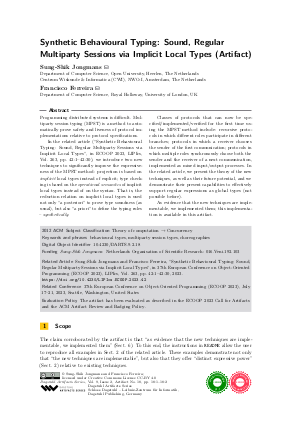Synthetic Behavioural Typing: Sound, Regular Multiparty Sessions via Implicit Local Types (Artifact)
Authors Sung-Shik Jongmans, Francisco Ferreira
-
Part of:
Issue:
Special Issue of the 37th European Conference on Object-Oriented Programming (ECOOP 2023)
Part of: Volume: DARTS, Volume 9 (ECOOP 2023)
Part of: Conference: European Conference on Object-Oriented Programming (ECOOP)
Part of: Journal: Dagstuhl Artifacts Series (DARTS) - License:
 Creative Commons Attribution 4.0 International license
Creative Commons Attribution 4.0 International license
- Publication Date: 2023-07-11
Artifact Description

PDF
DARTS.9.2.18.pdf
- Filesize: 428 kB
- 2 pages
Document Identifiers
Subject Classification
ACM Subject Classification
- Theory of computation → Concurrency
Keywords
- behavioural types
- multiparty session types
- choreographies
Metrics
- Access Statistics
-
Total Accesses (updated on a weekly basis)
0Document
0Metadata
Artifact
DARTS-9-2-18-artifact-040f9231263af8b0ef74fd29219b0d2e.zip
(Filesize: 9.28 GB)
MD5 Sum:
040f9231263af8b0ef74fd29219b0d2e
(Get MD5 Sum)
Artifact Evaluation Policy
The artifact has been evaluated as described in the ECOOP 2023 Call for Artifacts and the ACM Artifact Review and Badging Policy
Abstract
Programming distributed systems is difficult. Multiparty session typing (MPST) is a method to automatically prove safety and liveness of protocol implementations relative to protocol specifications.
In the related article ("Synthetic Behavioural Typing: Sound, Regular Multiparty Sessions via Implicit Local Types", in ECOOP 2023, LIPIcs, Vol. 263, pp. 42:1-42:30), we introduce two new techniques to significantly improve the expressiveness of the MPST method: projection is based on implicit local types instead of explicit; type checking is based on the operational semantics of implicit local types instead of on the syntax. That is, the reduction relation on implicit local types is used not only "a posteriori" to prove type soundness (as usual), but also "a priori" to define the typing rules - synthetically.
Classes of protocols that can now be specified/implemented/verified for the first time using the MPST method include: recursive protocols in which different roles participate in different branches; protocols in which a receiver chooses the sender of the first communication; protocols in which multiple roles synchronously choose both the sender and the receiver of a next communication, implemented as mixed input/output processes. In the related article, we present the theory of the new techniques, as well as their future potential, and we demonstrate their present capabilities to effectively support regular expressions as global types (not possible before).
As evidence that the new techniques are implementable, we implemented them; this implementation is available in this artifact.
Cite As Get BibTex
Sung-Shik Jongmans and Francisco Ferreira. Synthetic Behavioural Typing: Sound, Regular Multiparty Sessions via Implicit Local Types (Artifact). In Special Issue of the 37th European Conference on Object-Oriented Programming (ECOOP 2023). Dagstuhl Artifacts Series (DARTS), Volume 9, Issue 2, pp. 18:1-18:2, Schloss Dagstuhl – Leibniz-Zentrum für Informatik (2023)
https://doi.org/10.4230/DARTS.9.2.18
BibTex
@Article{jongmans_et_al:DARTS.9.2.18,
author = {Jongmans, Sung-Shik and Ferreira, Francisco},
title = {{Synthetic Behavioural Typing: Sound, Regular Multiparty Sessions via Implicit Local Types (Artifact)}},
pages = {18:1--18:2},
journal = {Dagstuhl Artifacts Series},
ISSN = {2509-8195},
year = {2023},
volume = {9},
number = {2},
editor = {Jongmans, Sung-Shik and Ferreira, Francisco},
publisher = {Schloss Dagstuhl -- Leibniz-Zentrum f{\"u}r Informatik},
address = {Dagstuhl, Germany},
URL = {https://drops.dagstuhl.de/entities/document/10.4230/DARTS.9.2.18},
URN = {urn:nbn:de:0030-drops-182580},
doi = {10.4230/DARTS.9.2.18},
annote = {Keywords: behavioural types, multiparty session types, choreographies}
}
Author Details
- Department of Computer Science, Open University, Heerlen, The Netherlands
- Centrum Wiskunde & Informatica (CWI), NWO-I, Amsterdam, The Netherlands
Funding
- Jongmans, Sung-Shik: Netherlands Organisation of Scientific Research: 016.Veni.192.103
Related Article
- Sung-Shik Jongmans and Francisco Ferreira, "Synthetic Behavioural Typing: Sound, Regular Multiparty Sessions via Implicit Local Types", in 37th European Conference on Object-Oriented Programming (ECOOP 2023), LIPIcs, Vol. 263, pp. 42:1-42:30, 2023. https://doi.org/10.4230/LIPIcs.ECOOP.2023.42
